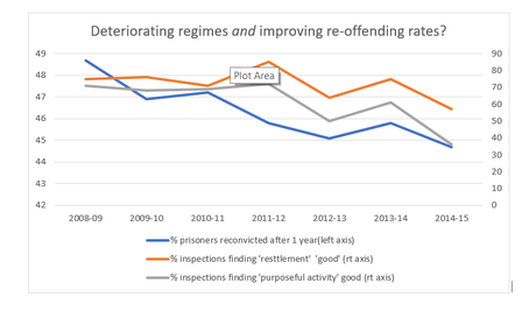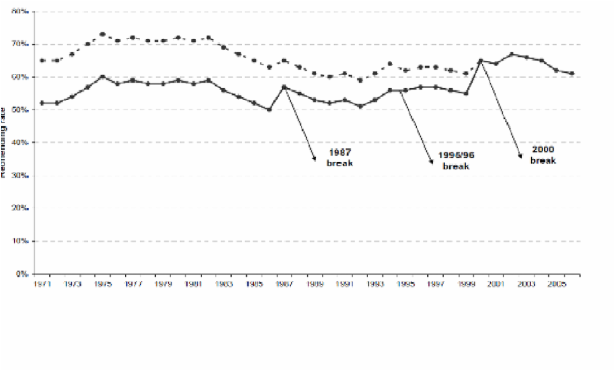|
There is a growing consensus that the central aim of prisons is rehabilitation, that therefore their performance is best measured by whether they reduce re-offending and that therefore the ideal measure would be re-conviction rates, if only we could work out how to overcome the various methodological problems (to do with isolating the effect of one particular prison on an offender who may pass though several, and then be supervised after released by probation services). The latest reconviction data, for those released from prison in 2014-15, casts doubt on this last assumption (I will return to the first on another occasion). It shows reconviction rates for prisoners falling steadily since the high point in 2007-08, including a 1% fall in 2014-15 - just as the prison system was reaching crisis point. In the same year, for the first time ever, the Chief Inspector rated 'resettlement' activity as 'poor' or 'not sufficiently good' in more than 60% of prisons inspected, and 'purpseful activity' even lower, at just 36% (it must be said that as the mix of prisons inspected is different in each year, comparisons over time are not precise: nevertheless, the trends here are clear.) Figure 1 : regimes and re-offending trends The disjunction between the trends is starting (graph 1, above). They suggest that the prison service was, at long last, succeeding in cutting re-offending, just as it reached breaking point. Clearly, that's nonsense. A look at longer term trends is also salutary: figure 2 shows changes in re-conviction rates from 1971 to 2006. Again, the sharp downward trend between 1980 and 1990 (on the 'adjusted' line) is utterly counter-intuitive, as this too was a period of deepening crisis in prisons, of the 'nothing works' doctrine in criminology, appalling living conditions, non existent regimes and in 1990, the worst prisons riots in history. (It was after all at just this point that a Government White Paper stated that prisons were “an expensive way of making bad people worse”!). It seems safe to say that if reconviction rates really did fall so markedly in that period, it was not thanks to the prison service.
I am not of course saying reconviction rates are useless, obviously we do need them as information: but I am becoming more dubious that they are useful as measures of performance, particularly at the level of a percentage point movement here or there, year on year. (Which is how they are used in 'performance by results' or PBR contracts, which, therefore, are a mistake.) There is a wider point about Government here. The fashion for setting numerical targets for changing social behaviour on a huge scale really got going in the early '90s – curiously, under a Tory Government. I recall Chris Lewis, head statistician in the Home Office, explain to Home Office Ministers then that it was unrealistic for Government to pretend it could control the crime rate: he sounded awfully no-can-do, but of course, he was right. I recall similar protests from the public health people, when I was in the NHS, when numerical targets were set for reducing the suicide rate. Of course, this sort of thing became all the rage under Blair. And continued under Cameron – with the supreme fatuity of a 'national happiness index', which he hoped would 'inform' policy decisions (ONS are still publishing this, though sadly, not their assessment of how far various Government policies have made us happier, or not). It's one thing to say that public services should do their best to help individuals who are suicidal, or who may want to avoid drifting back into crime - clearly, they must, to the very best of their ability. But it's quite another to view the State has having the power to modify human behaviour on a gigantic scale, like a finely tuned machine, It doesn't. And, back in the days when Tories actually were Tories, they would have said: 'and thank God for that'.
0 Comments
Your comment will be posted after it is approved.
Leave a Reply. |
I was formerly Finance Director of the Prison Service and then Director of the National Offender Management Service responsible for competition. I also worked in the NHS and an IT company. I later worked for two outsourcing companies.
Archives
July 2024
Categories
All
Click below to receive regular updates
|


 RSS Feed
RSS Feed